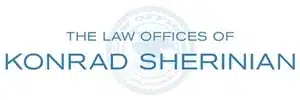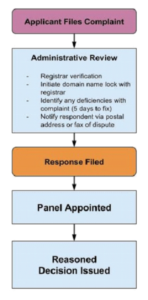UDRP
THE UNIFORM DOMAIN NAME DISPUTE RESOLUTION POLICY
Cyber Law
Talk with an experienced cyber law attorney today.
The Uniform Domain Name Dispute Resolution Policy (UDRP) is an arbitration process established by the Internet Corporation for Assigned Names and Numbers (ICANN) for the resolution of disputes regarding the registration of Internet domain names. The UDRP applies to all generic top level domains, many country code top level domains, and some legacy top level domains; i.e., .com, .net, .org, etc. Overall, the vast majority of domains are subject to UDRP, but a few important ones are not. For example, .edu domain names are not subject to the UDRP.
When a registrant chooses a domain name within those domains that are subject to the UDRP, the registrant must warrant that registering the name will not infringe upon or otherwise violate the legal rights of any third party and agree to participate in the UDRP arbitration process should any third party assert such a claim.
In addition to having a dispute with a person who registered a domain subject to the UDRP, a rights holder must also have rights in a valid trademark. The trademark does not need to be registered, although registration generally makes proving rights far easier.
The UDRP arbitration process is illustrated below:
The total time from filing of a complaint to issuance of a decision can be as little as forty-five days. A party that is unhappy with a UDRP decision has ten days to file a case in a court of competent jurisdiction and provides proper notice of the filing. Otherwise, the panel’s decision will be implemented; i..e, the domain will typically be canceled, transferred or retained with the existing registrant.
To succeed in a UDRP proceeding, a mark holder must establish that 1) the domain name is identical to, or confusingly similar to a mark that the mark holder has rights to; 2) the registrant does not have rights or legitimate interests in the domain name; and 3) the domain name has been registered and the domain name is being used in “bad faith.”
To establish the first element, which is that the domain name is identical to, or confusingly similar to a mark that the mark holder has rights to, the typical threshold test is a direct comparison between the trademark and the alphanumeric strict of the domain name. A measure of confusing similarity is then made using standard trademark principles.
With regards to the second element; i.e., that the registrant does not have rights or legitimate interests in the domain name, the initial burden is on the Complainant. However, if the Complainant presents a prima facie case of the registrant’s lack of rights, the burden shifts to the registrant to demonstrate their legitimate rights in the domain.
Panels generally will not recognize rights based merely on registration of a domain name. Rather, the use or intended use of the domain must not be intended to infringe or trade upon the rights of a third party, such as the Complainant.
Turning to the third element; i.e., registration and use in bad faith, the Complainant must establish that the registrant lacked a legitimate purpose when registering the domain. For example, if the domain name was registered with the purpose of selling it to the Complainant, or for trading off Complainant’s mark for the registrant’s commercial gain, that will generally be sufficient. Registration has been interpreted to include acquisition of a domain name, and even renewal of a domain name after being apprised of mark holder’s rights.
Use of a domain in bad faith includes “parking” a domain, which can include sporadic use, as well as allowing infringing third party material to be placed on the site, including automatically generated third party pay-per-click advertising. In addition, in certain circumstances, the use of third party privacy registration services can be a factor in determining bad faith.
If a mark holder loses a UDRP proceeding, it can still bring a complaint under the Anticybersquatting Consumer Protection Act (ACPA). If a domain name registrant loses a UDRP proceeding it must file a lawsuit against the mark holder within ten days to prevent ICANN from transferring the domain name.
Many customers ask about advantages and disadvantages of the UDRP and the URS. Generally, the URS is less expensive, but far more limited. In addition, both processes can be used together – for example, while the URS does not allow for the transfer of domains, a rights holder can use the URS to quickly force a suspension of a domain and then use the UDRP to force a transfer. Contact our domain name attorneys for advice on this if you have questions.
The Law Offices of Konrad Sherinian, LLC is pleased to offer UDRP domain name services on a flat fee basis. Our legal fee is $3500 per challenged domain; note this is in addition to the UDRP provider’s fee—presently $1500 for a single member panel, and $4000 for a three member panel. For respondents, our legal fee is $4950 per challenged domain. Contact us today, and we can advise you of your options.
Experienced CyberLaw Attorneys
The attorneys at the Law Offices of Konrad Sherinian Law have years of experience in handling a broad range of cyber law issues. We have worked extensively with both employers and employees and have obtained results on both sides of a case.
With our experience in the traditional courtroom setting and the various alternative dispute resolution methods, we can help you with your cyber law matters.

Voted Best in Chicago
Let’s Talk About Your CyberLaw Issue
Phone Consultation
Find it easier to talk rather than write? Have a lot of questions you want to ask? Let's talk over the phone.
Virtual Consultation
Need to share something on screen with us? Like to see who you are working with? Let's get online.
In-Person Consultation
Prefer a face-to-face and a handshake? We have offices in Chicago and Naperville, Illinois.
If you have a question concerning any form of cyber law, please feel free to reach out to us via phone or any of the ways above. We will strive to get back to you within 24 hours.
Available 24/7




